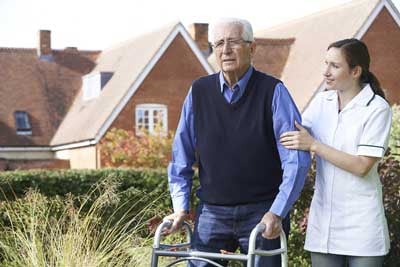 Forgetfulness can be a normal result of aging. But many seniors are worried that an occasional bout of forgetfulness may signal a much more serious problem such as Alzheimer's or another form of dementia. This is not an entirely baseless worry, as 1 in 9 Americans over the age of 65 has Alzheimer's disease.
Forgetfulness can be a normal result of aging. But many seniors are worried that an occasional bout of forgetfulness may signal a much more serious problem such as Alzheimer's or another form of dementia. This is not an entirely baseless worry, as 1 in 9 Americans over the age of 65 has Alzheimer's disease.If you are providing care for an aged love one, you may also have some concerns about cognitive changes in your senior. What is normal senior forgetfulness and what are warning signs of Alzheimer's? Here are some signs provided by the Alzheimer's Association to help you determine if and when to consult with a physician concerning your loved one's mental health.
Memory Loss: By far, the most recognizable symptom of Alzheimer's is memory loss. It is perfectly normal to forget a name or an address once in a while. But, if your senior's memory lapses are interfering with his or her daily life, then it is time to consult a doctor.
Personality Changes: Marked personality changes may be a warning sign for dementia. For instance, is your shy, quiet father suddenly the life of the party? Or is your normally fastidious mother suddenly completely uninterested in keeping up her appearance or cleaning her home? Drastic personality changes may be indicative of a serious problem. It is important to note, however, that everyone is prone to mood swings now and then. So, some physicians suggest that you worry about marked personality changes only when they persist for more than a few days.
Difficulty with Problem Solving: While it may be perfectly natural for a senior to be bewildered when trying to figure out how to use a piece of new technology, difficulty in solving problems that were once easy is a sign that something may be amiss. For instance, if your loved one is suddenly incapable of balancing a checkbook or figuring out how to change the oil in his car, you may need to consult with a doctor.
Disorientation with Time or Place: It is sometimes easy for a senior to forget the days of the week, likely because he or she may now have a schedule that varies little from day to day. However, if your loved one sometimes gets the seasons of the year confused, or has trouble figuring out where he or she is, that may be a sign of a more serious issue.
Misplacing Items and Losing the Ability to Retrace Steps: Everyone, no matter the age, misplaces something occasionally. However, if your loved one often misplaces things only to find them later in odd or unusual places, that is a concerning sign. For instance, if your loved one finds his or her car keys in the refrigerator, or has trouble retracing his or her steps to find a misplaced item, a trip to the doctor may be indicated.

Next Steps for Handling Dementia
If your loved one is exhibiting any of these symptoms, it is important to speak with his or her physician. Early detection of mental issues often leads to significantly better outcomes for dementia patients. When you speak with a physician about the issue, he or she may be able to provide good counsel about next steps you can take.
Many medical professionals advocate home care for dementia patients. Home care workers can help you more effectively see to the needs of your loved one. How? Home care workers offer focused observation of your loved one, enabling you to have peace of mind knowing that your senior is cared for when you are unavailable. If you are concerned about the mental wellbeing of your loved one, contact us today. We stand ready to help you find the best home care for your loved one, no matter the situation.

